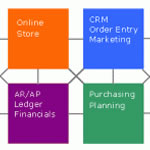
A study by the U.S. Bureau of the Census, Business Success: Factors Leading to Surviving and Closing Successfully, by Brian Headd, Center for Economic Studies, found that:
"Major factors in a firm's remaining open include an ample supply of capital, the fact that a firm is large enough to have employees, the owner's education level, and the owner's reason for starting the firm in the first place, such as freedom for family life or wanting to be one's own boss."

Let's look at that second reason for remaining open, "large enough to have employees." By far, most business startups are because an individual has an idea, a belief in their abilities and a desire to be their own boss. They cobble together the resources they need and invest a generous portion of their own human capital. The business grows, customers are added, new products introduced and the next thing that new owner knows — it's time to start hiring employees. Then the challenge begins.
The key differentiator of business management software solutions is the capability of the solution to be a true multi-user application. There simply is no such thing as an enterprise class integrated business management and accounting solution that is not designed to be used simultaneously by multiple individual users. By far the leading accounting software package used by startup businesses is Quickbooks, mainly because its cheap and easy to use, but Quickbooks is not a multi-user application. (Yes, the Enterprise Edition is and by definition the online version is — sorta, but that's not the point of this post). "Sharing" an application is not the same as having multiple users.
In order to get the most out of your employees and resources it is critical that everyone is able to collaborate around common principles. One main objective of implementing business management software is to have an integrated solution where data is generally enter once, actions create further actions (think supply chain management) and processes are automated. In order to accomplish this objective your management solution must utilize a robust relational database which allows for many users to be accessing and updating information simultaneously while providing security and data integrity. Further the database and the application work hand in hand to manage users, privileges and transactions.
So when your business has grown and you realize its time to leverage technology to increase your business's efficiency and ability to service your customers — start you ERP search with those solutions that provide multiple user functionality as a fundamental concept.